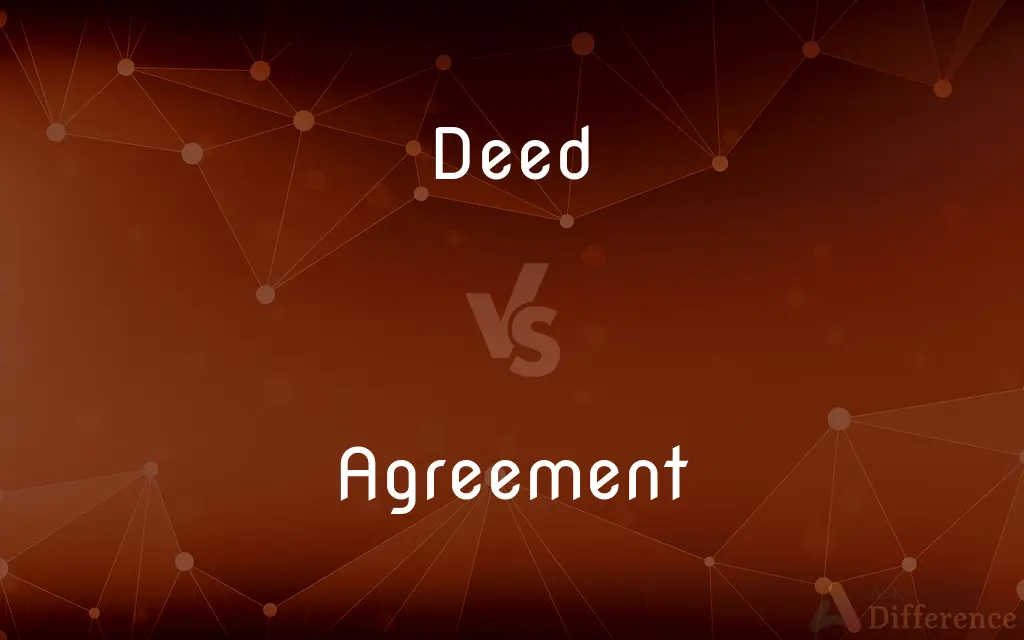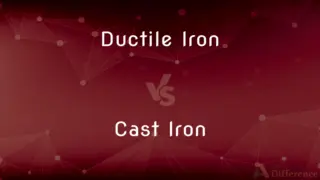Deed vs. Agreement — What's the Difference?
By Tayyaba Rehman & Maham Liaqat — Published on August 14, 2024
A deed is a formal legal document transferring ownership or rights in property, requiring signatures and witnesses, while an agreement is a broader term for any understanding or arrangement between parties, possibly including contracts.

Difference Between Deed and Agreement
Table of Contents
ADVERTISEMENT
Key Differences
A deed is a specialized type of legal document that signifies an agreement to transfer rights, ownership, or interest in real or personal property from one party to another. It is formal, often requiring not just the signatures of the involved parties but also witnesses and, in many cases, a seal to be legally valid. This formality underlines the deed's significance in conveying property rights, making it a pivotal document in real estate transactions.
Agreements, on the other hand, encompass a wider range of understandings or arrangements between two or more parties. They can be formal, like contracts, requiring signatures but not necessarily witnesses or a seal, or informal, such as verbal agreements. Agreements detail the terms and conditions of a relationship, transaction, or understanding between parties and can cover a vast array of subjects beyond property, including services, employment, and sales.
The creation and execution of a deed are governed by stricter legal standards compared to most agreements. For instance, deeds often need to be executed in the presence of a notary or witnesses, adding a layer of formality and legal solemnity to the transaction. This requirement underscores the deed's role in transferring significant rights or interests, particularly in real estate.
Agreements can be binding or non-binding, depending on their nature and the presence of essential contract elements (offer, acceptance, consideration), while deeds are always binding once properly executed. The binding nature of a deed underscores its importance and the seriousness with which it is treated in legal contexts, particularly in the conveyance of property.
The enforceability of deeds and agreements also differs. A deed, once executed according to legal requirements, is immediately enforceable in court. An agreement, however, may require additional elements to be enforceable, such as consideration (something of value exchanged between the parties) and a clear intention to create legal relations.
ADVERTISEMENT
Comparison Chart
Definition
A formal document transferring property rights.
A mutual understanding or arrangement.
Formality
Requires signatures, witnesses, and sometimes a seal.
May require signatures, but less formal.
Scope
Primarily used for property transactions.
Covers a wide range of subjects.
Legal Requirements
Must be executed with higher legal formalities.
Legal formalities vary based on the agreement type.
Enforceability
Immediately enforceable in court.
Enforceability depends on the presence of contract elements.
Compare with Definitions
Deed
A legal document representing the ownership of property.
She received a deed after purchasing the house.
Agreement
A mutual understanding between parties.
They reached an agreement on the sale price.
Deed
Often requires a seal to be legally valid.
The corporate deed included the company's seal.
Agreement
Can be formal or informal.
The verbal agreement was later put into writing.
Deed
Conveys rights or interests in real estate.
The deed to the land was transferred to his name.
Agreement
Not always legally binding.
The agreement to meet for lunch was informal.
Deed
Must be signed by the grantor and witnessed.
The deed was signed in the presence of two witnesses.
Agreement
Covers a broad range of subjects.
The agreement included terms for maintenance services.
Deed
Used to grant easements or life estates.
They granted an easement through a deed.
Agreement
Requires offer, acceptance, and consideration to be enforceable.
The contract became a binding agreement once the deposit was paid.
Deed
Something that is carried out; an act or action.
Agreement
The act of agreeing
When did the agreement take place?.
Deed
A usually praiseworthy act; a feat or exploit.
Agreement
Harmony of opinion; accord
Since we are all in agreement, let's proceed.
Deed
Action or performance in general
Deeds, not words, matter most.
Agreement
An arrangement between parties, usually resulting from a discussion, regarding a course of action.
Deed
(legal) A legal instrument that is executed under seal or before a witness; sometimes required for certain legal activities, such as the transfer of certain kinds of property.
Agreement
A legally binding contract enforceable in a court of law.
Deed
To transfer real property by deed.
He deeded over the mineral rights to some fellas from Denver.
Agreement
State of agreeing; harmony of opinion, statement, action, or character; concurrence; concord; conformity; as, a good agreement subsists among the members of the council.
What agreement hath the temple of God with idols ?
Expansion and duration have this further agreement.
Deed
That which is done or effected by a responsible agent; an act; an action; a thing done; - a word of extensive application, including, whatever is done, good or bad, great or small.
And Joseph said to them, What deed is this which ye have done?
We receive the due reward of our deeds.
Would serve his kind in deed and word.
Agreement
A concurrence in an engagement that something shall be done or omitted; an exchange of promises; mutual understanding, arrangement, or stipulation; a contract.
Deed
A sealed instrument in writing, on paper or parchment, duly executed and delivered, containing some transfer, bargain, or contract.
Agreement
Harmony of people's opinions or actions or characters;
The two parties were in agreement
Deed
To convey or transfer by deed; as, he deeded all his estate to his eldest son.
Agreement
The verbal act of agreeing
Deed
A legal document signed and sealed and delivered to effect a transfer of property and to show the legal right to possess it;
He signed the deed
He kept the title to his car in the glove compartment
Common Curiosities
Is a deed always related to property transactions?
Primarily, yes, deeds are used in property transactions to convey ownership or rights.
What is the main difference between a deed and an agreement?
A deed is a formal document for transferring property rights, requiring specific legal formalities, whereas an agreement can be any arrangement between parties.
Can an agreement be verbal?
Yes, agreements can be verbal or written, though verbal agreements may be harder to enforce.
Do all agreements need to be witnessed?
No, not all agreements need witnesses, unlike deeds which typically require witnessing.
Is a deed legally binding once signed?
Yes, a deed is legally binding and enforceable once properly executed.
Can an agreement be binding without consideration?
Generally, consideration is required for an agreement to be legally binding, except in certain exceptions.
Are all deeds related to real estate?
While most deeds involve real estate, they can also grant other rights, like easements.
Can a deed be revoked?
Once executed, a deed is permanent unless overturned by a court or replaced by another deed.
What makes a deed valid?
Signatures of the parties involved, witnesses, and sometimes a seal make a deed valid.
How is an agreement different from a contract?
A contract is a type of agreement that is legally binding and meets specific criteria, including consideration.
What is consideration in an agreement?
Consideration is something of value exchanged between the parties in an agreement.
What happens if an agreement is broken?
If an agreement is legally binding and broken, the injured party may seek enforcement or damages in court.
Can any agreement be turned into a deed?
Not all agreements qualify to be turned into deeds, as deeds have specific legal requirements.
Why are witnesses required for a deed?
Witnesses add a layer of verification and formality, ensuring the deed's authenticity and preventing fraud.
Are deeds public records?
Yes, once filed with the appropriate government office, deeds become public records.
Share Your Discovery

Previous Comparison
Incalls Services vs. Outcalls Services
Next Comparison
Ductile Iron vs. Cast IronAuthor Spotlight
Written by
Tayyaba RehmanTayyaba Rehman is a distinguished writer, currently serving as a primary contributor to askdifference.com. As a researcher in semantics and etymology, Tayyaba's passion for the complexity of languages and their distinctions has found a perfect home on the platform. Tayyaba delves into the intricacies of language, distinguishing between commonly confused words and phrases, thereby providing clarity for readers worldwide.
Co-written by
Maham Liaqat












































